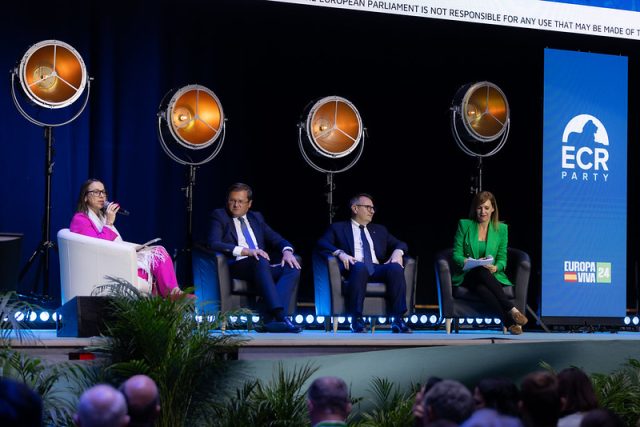
Thousands of patriots have gathered this weekend in Madrid to attend the EUROPAVIVA24 meeting, the great convention of European patriots organised by ECR Party and VOX. Throughout Saturday a series of panels took place within the meeting in which political, academic and social representatives discussed the challenges and opportunities for the continent and for European conservatives in view of the upcoming election.
One of this panels, moderated by Alessandra Priante, president of the Italian National Tourism Agency was entitled “Tourism looking at Judeo-Christian landmarks of Europe”, and was attended by speakers Andrzej Sadós, ambassador and former Permanent Representative of Poland to the EU; Gianluca Caramanna, member of the Italian Parliament for Fratelli d’Italia; and Patricia Rueda, member of the Spanish Parliament for the VOX party.
One of the first things that were stated and that met with the approval and recognition not only of the speakers but also of the audience, was in relation to the Judeo-Christian references throughout Europe. All of them are a constant reminder of the fundamental pillars that sustained, and must continue to sustain, the European Union, and also encourage and inspire us to keep our cultural heritage alive. In fact, every European citizen is responsible for safeguarding a legacy that spans entire millennia and whose survival is, from now on, an imperative necessity for the proper functioning of European civilization.
Christian tourism, and therefore also cultural tourism, is one of the main roots that even today continue to be a fundamental reason to attract citizens from within and outside European borders, as is shared by Spain, Italy and Poland, countries with strong links and attraction for this tourism. So much so that Caramanna stated that “religious tourism is the promotion of our values and our identity”.
But not only that. Tourism also has great potential to curb the negative consequences of depopulation in some rural areas of countries such as Italy, Spain and France. In this sense, the panellists recalled the need to enhance the value of the Judeo-Christian legacy of our nations, which finds its greatest exponent in the heritage of our villages.
The final speech of each panelist was addressed to the next European Parliament and its work in the field of tourism. Important conclusions could be drawn from some of them. Sadós stated that, although the new legislators have the tools and processes to manage the future, “they cannot do so forgetting the past, nor the common denominator of European Christian culture or our roots”. For his part, Rueda stressed the need for the European Union and, more specifically, the “globalist elites” to stop imposing how the heritage, customs and culture of each sovereign state should be managed.
This is an example of how national and international policies can articulate vectors and strategies to safeguard the common heritage and legacy that we have recognised for centuries. A heritage and legacy that is based on Judeo-Christian values and is reflected, among many other things, in the architectural and cultural display of our towns and cities.
Tourism is one of the main sectors for the European economy, especially for the southern countries. It generates enormous wealth and employs millions of people across the continent. That is why all proposals related to tourism must have a special position in the programmes that the parties will present in the next European elections. We have before us a unique opportunity to promote tourism that respects, dialogues and understands the living essence of the nations of the European Union. A tourism that is open and open to dialogue, but firm in the face of interference from those who think that there is nothing left of the Judeo-Christian tradition in Europe.



 Subscribe
Subscribe